Analysis of Common Language Policy in a Public Utility Company
VerifiedAdded on 2022/09/21
|8
|1840
|17
Report
AI Summary
This research proposal examines the role of common language policies in public utility companies, especially within multinational contexts. The study aims to identify best practices in language management, propose implementation strategies, and offer recommendations for future research. The methodology involves analyzing case studies to assess the effectiveness of common language policies. The research highlights the significance of corporate language policies due to the limited academic research in the field, their direct impact on employees, and their influence on government language policies. The conceptual framework explores language dynamics, including the use of parent company languages, subsidiary languages, and the implications of language policy on power dynamics and human resources management. The research also considers the implications of language planning for human resources management, emphasizing the importance of language standardization. The study is limited to a specific geographical area. The conclusion emphasizes the significance of information flow and communication in global partnerships, particularly through the role of expatriate managers.
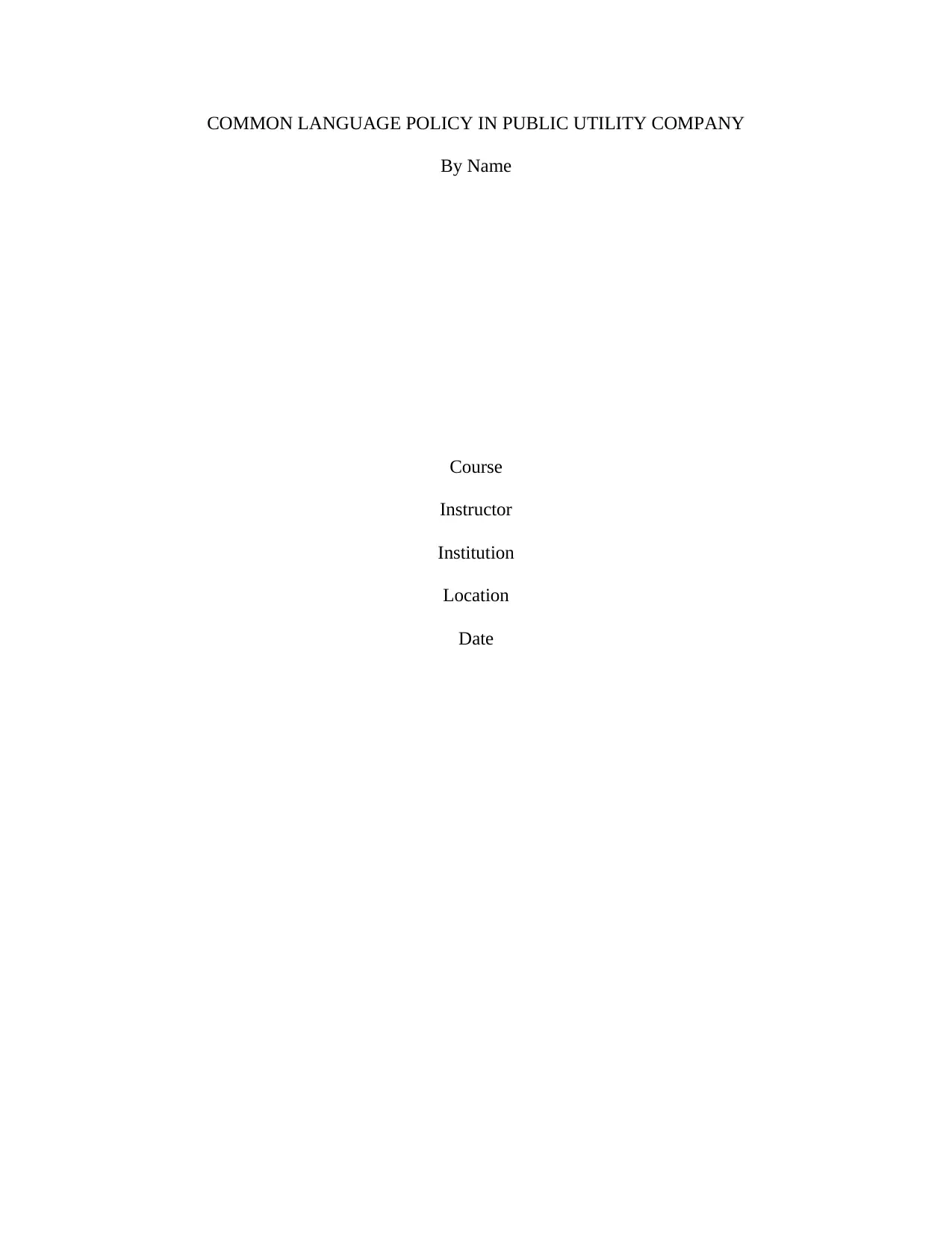
COMMON LANGUAGE POLICY IN PUBLIC UTILITY COMPANY
By Name
Course
Instructor
Institution
Location
Date
By Name
Course
Instructor
Institution
Location
Date
Paraphrase This Document
Need a fresh take? Get an instant paraphrase of this document with our AI Paraphraser
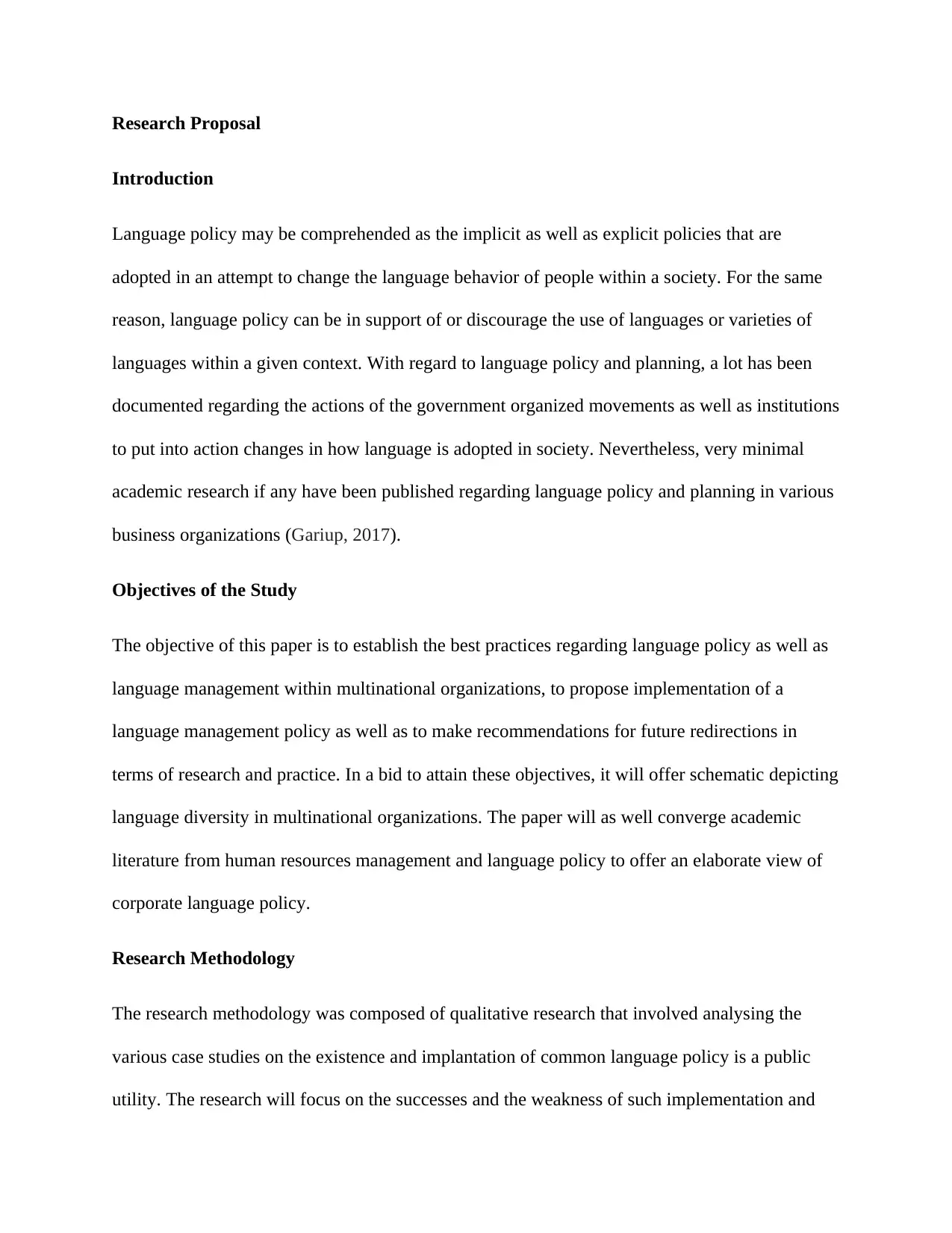
Research Proposal
Introduction
Language policy may be comprehended as the implicit as well as explicit policies that are
adopted in an attempt to change the language behavior of people within a society. For the same
reason, language policy can be in support of or discourage the use of languages or varieties of
languages within a given context. With regard to language policy and planning, a lot has been
documented regarding the actions of the government organized movements as well as institutions
to put into action changes in how language is adopted in society. Nevertheless, very minimal
academic research if any have been published regarding language policy and planning in various
business organizations (Gariup, 2017).
Objectives of the Study
The objective of this paper is to establish the best practices regarding language policy as well as
language management within multinational organizations, to propose implementation of a
language management policy as well as to make recommendations for future redirections in
terms of research and practice. In a bid to attain these objectives, it will offer schematic depicting
language diversity in multinational organizations. The paper will as well converge academic
literature from human resources management and language policy to offer an elaborate view of
corporate language policy.
Research Methodology
The research methodology was composed of qualitative research that involved analysing the
various case studies on the existence and implantation of common language policy is a public
utility. The research will focus on the successes and the weakness of such implementation and
Introduction
Language policy may be comprehended as the implicit as well as explicit policies that are
adopted in an attempt to change the language behavior of people within a society. For the same
reason, language policy can be in support of or discourage the use of languages or varieties of
languages within a given context. With regard to language policy and planning, a lot has been
documented regarding the actions of the government organized movements as well as institutions
to put into action changes in how language is adopted in society. Nevertheless, very minimal
academic research if any have been published regarding language policy and planning in various
business organizations (Gariup, 2017).
Objectives of the Study
The objective of this paper is to establish the best practices regarding language policy as well as
language management within multinational organizations, to propose implementation of a
language management policy as well as to make recommendations for future redirections in
terms of research and practice. In a bid to attain these objectives, it will offer schematic depicting
language diversity in multinational organizations. The paper will as well converge academic
literature from human resources management and language policy to offer an elaborate view of
corporate language policy.
Research Methodology
The research methodology was composed of qualitative research that involved analysing the
various case studies on the existence and implantation of common language policy is a public
utility. The research will focus on the successes and the weakness of such implementation and
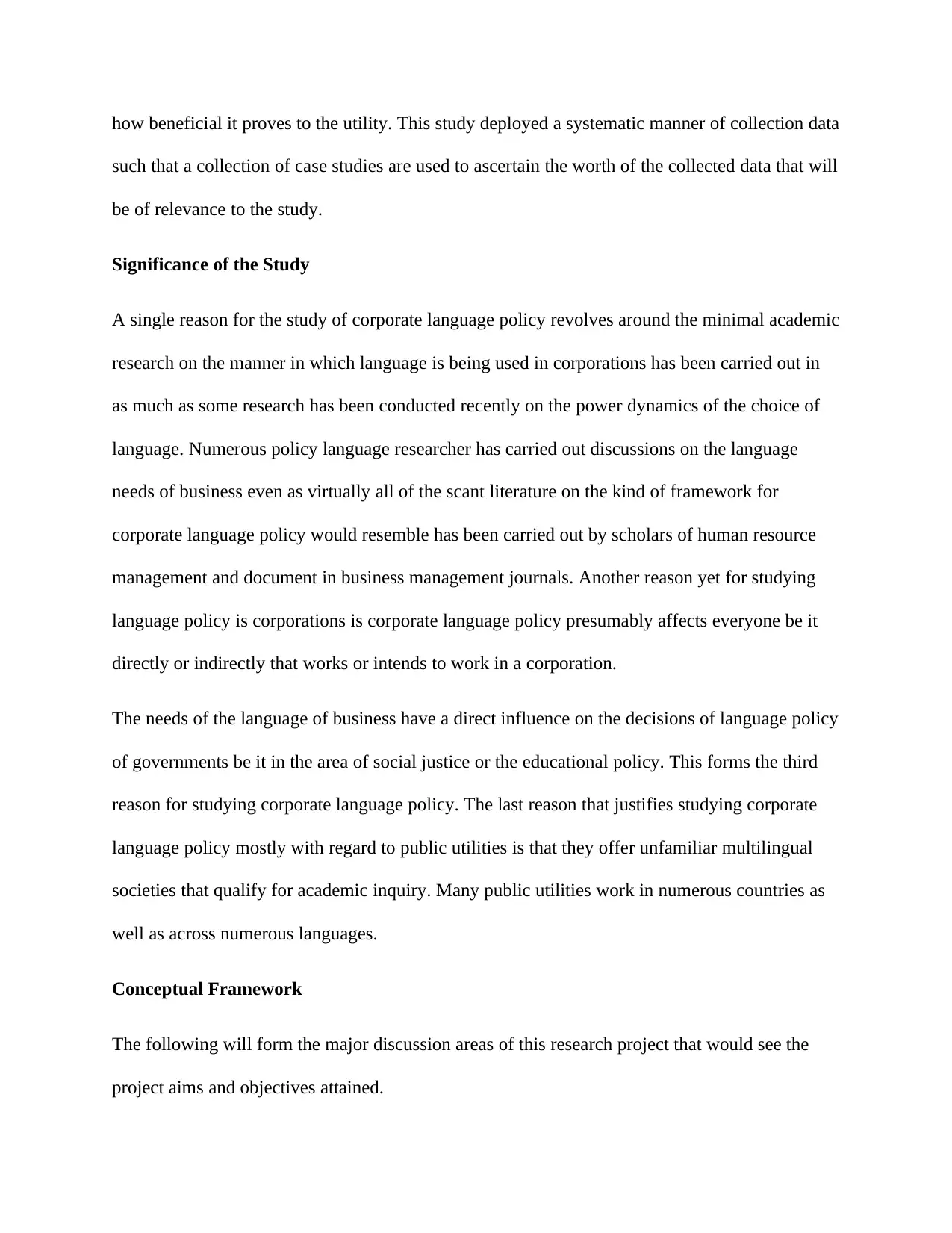
how beneficial it proves to the utility. This study deployed a systematic manner of collection data
such that a collection of case studies are used to ascertain the worth of the collected data that will
be of relevance to the study.
Significance of the Study
A single reason for the study of corporate language policy revolves around the minimal academic
research on the manner in which language is being used in corporations has been carried out in
as much as some research has been conducted recently on the power dynamics of the choice of
language. Numerous policy language researcher has carried out discussions on the language
needs of business even as virtually all of the scant literature on the kind of framework for
corporate language policy would resemble has been carried out by scholars of human resource
management and document in business management journals. Another reason yet for studying
language policy is corporations is corporate language policy presumably affects everyone be it
directly or indirectly that works or intends to work in a corporation.
The needs of the language of business have a direct influence on the decisions of language policy
of governments be it in the area of social justice or the educational policy. This forms the third
reason for studying corporate language policy. The last reason that justifies studying corporate
language policy mostly with regard to public utilities is that they offer unfamiliar multilingual
societies that qualify for academic inquiry. Many public utilities work in numerous countries as
well as across numerous languages.
Conceptual Framework
The following will form the major discussion areas of this research project that would see the
project aims and objectives attained.
such that a collection of case studies are used to ascertain the worth of the collected data that will
be of relevance to the study.
Significance of the Study
A single reason for the study of corporate language policy revolves around the minimal academic
research on the manner in which language is being used in corporations has been carried out in
as much as some research has been conducted recently on the power dynamics of the choice of
language. Numerous policy language researcher has carried out discussions on the language
needs of business even as virtually all of the scant literature on the kind of framework for
corporate language policy would resemble has been carried out by scholars of human resource
management and document in business management journals. Another reason yet for studying
language policy is corporations is corporate language policy presumably affects everyone be it
directly or indirectly that works or intends to work in a corporation.
The needs of the language of business have a direct influence on the decisions of language policy
of governments be it in the area of social justice or the educational policy. This forms the third
reason for studying corporate language policy. The last reason that justifies studying corporate
language policy mostly with regard to public utilities is that they offer unfamiliar multilingual
societies that qualify for academic inquiry. Many public utilities work in numerous countries as
well as across numerous languages.
Conceptual Framework
The following will form the major discussion areas of this research project that would see the
project aims and objectives attained.
⊘ This is a preview!⊘
Do you want full access?
Subscribe today to unlock all pages.

Trusted by 1+ million students worldwide
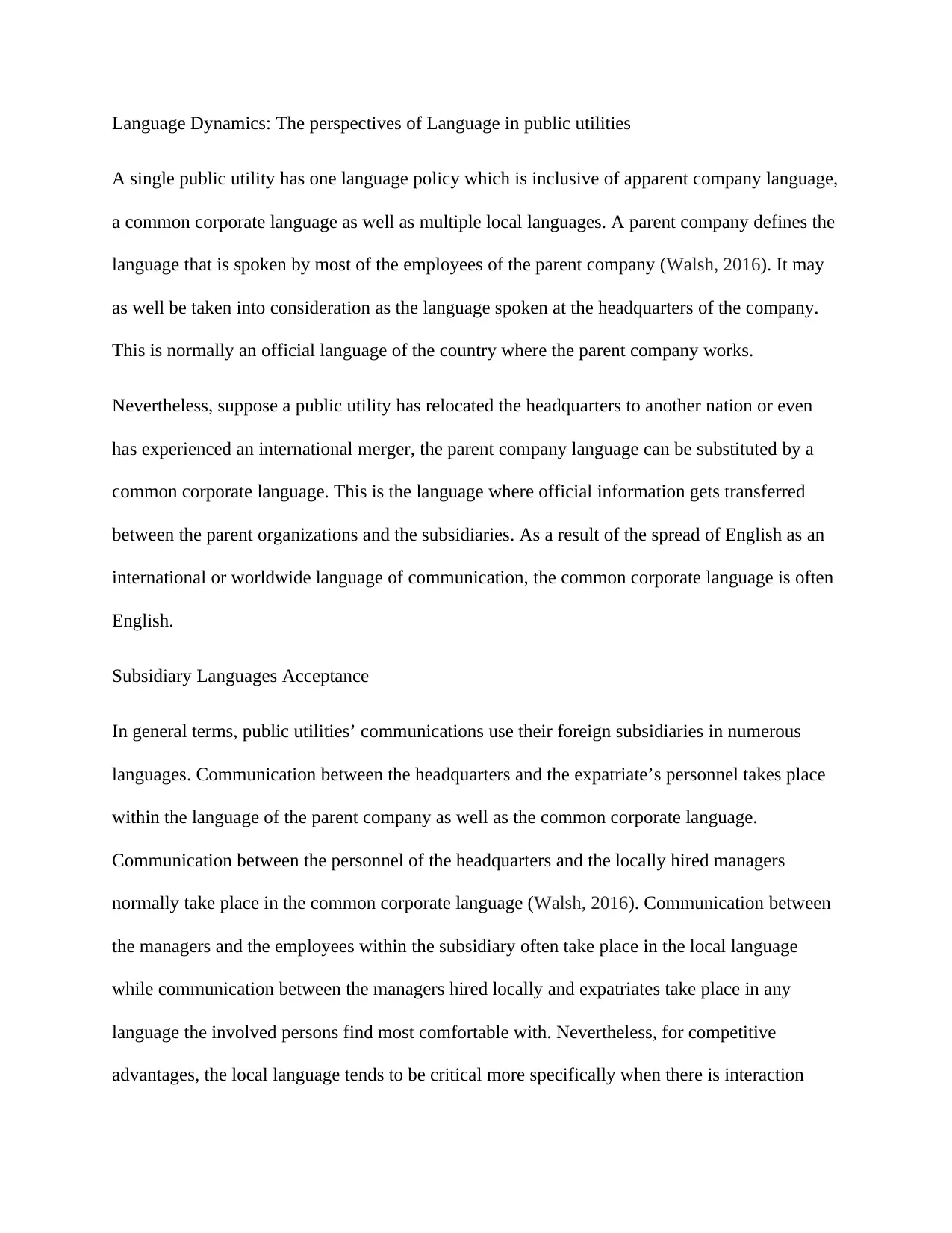
Language Dynamics: The perspectives of Language in public utilities
A single public utility has one language policy which is inclusive of apparent company language,
a common corporate language as well as multiple local languages. A parent company defines the
language that is spoken by most of the employees of the parent company (Walsh, 2016). It may
as well be taken into consideration as the language spoken at the headquarters of the company.
This is normally an official language of the country where the parent company works.
Nevertheless, suppose a public utility has relocated the headquarters to another nation or even
has experienced an international merger, the parent company language can be substituted by a
common corporate language. This is the language where official information gets transferred
between the parent organizations and the subsidiaries. As a result of the spread of English as an
international or worldwide language of communication, the common corporate language is often
English.
Subsidiary Languages Acceptance
In general terms, public utilities’ communications use their foreign subsidiaries in numerous
languages. Communication between the headquarters and the expatriate’s personnel takes place
within the language of the parent company as well as the common corporate language.
Communication between the personnel of the headquarters and the locally hired managers
normally take place in the common corporate language (Walsh, 2016). Communication between
the managers and the employees within the subsidiary often take place in the local language
while communication between the managers hired locally and expatriates take place in any
language the involved persons find most comfortable with. Nevertheless, for competitive
advantages, the local language tends to be critical more specifically when there is interaction
A single public utility has one language policy which is inclusive of apparent company language,
a common corporate language as well as multiple local languages. A parent company defines the
language that is spoken by most of the employees of the parent company (Walsh, 2016). It may
as well be taken into consideration as the language spoken at the headquarters of the company.
This is normally an official language of the country where the parent company works.
Nevertheless, suppose a public utility has relocated the headquarters to another nation or even
has experienced an international merger, the parent company language can be substituted by a
common corporate language. This is the language where official information gets transferred
between the parent organizations and the subsidiaries. As a result of the spread of English as an
international or worldwide language of communication, the common corporate language is often
English.
Subsidiary Languages Acceptance
In general terms, public utilities’ communications use their foreign subsidiaries in numerous
languages. Communication between the headquarters and the expatriate’s personnel takes place
within the language of the parent company as well as the common corporate language.
Communication between the personnel of the headquarters and the locally hired managers
normally take place in the common corporate language (Walsh, 2016). Communication between
the managers and the employees within the subsidiary often take place in the local language
while communication between the managers hired locally and expatriates take place in any
language the involved persons find most comfortable with. Nevertheless, for competitive
advantages, the local language tends to be critical more specifically when there is interaction
Paraphrase This Document
Need a fresh take? Get an instant paraphrase of this document with our AI Paraphraser
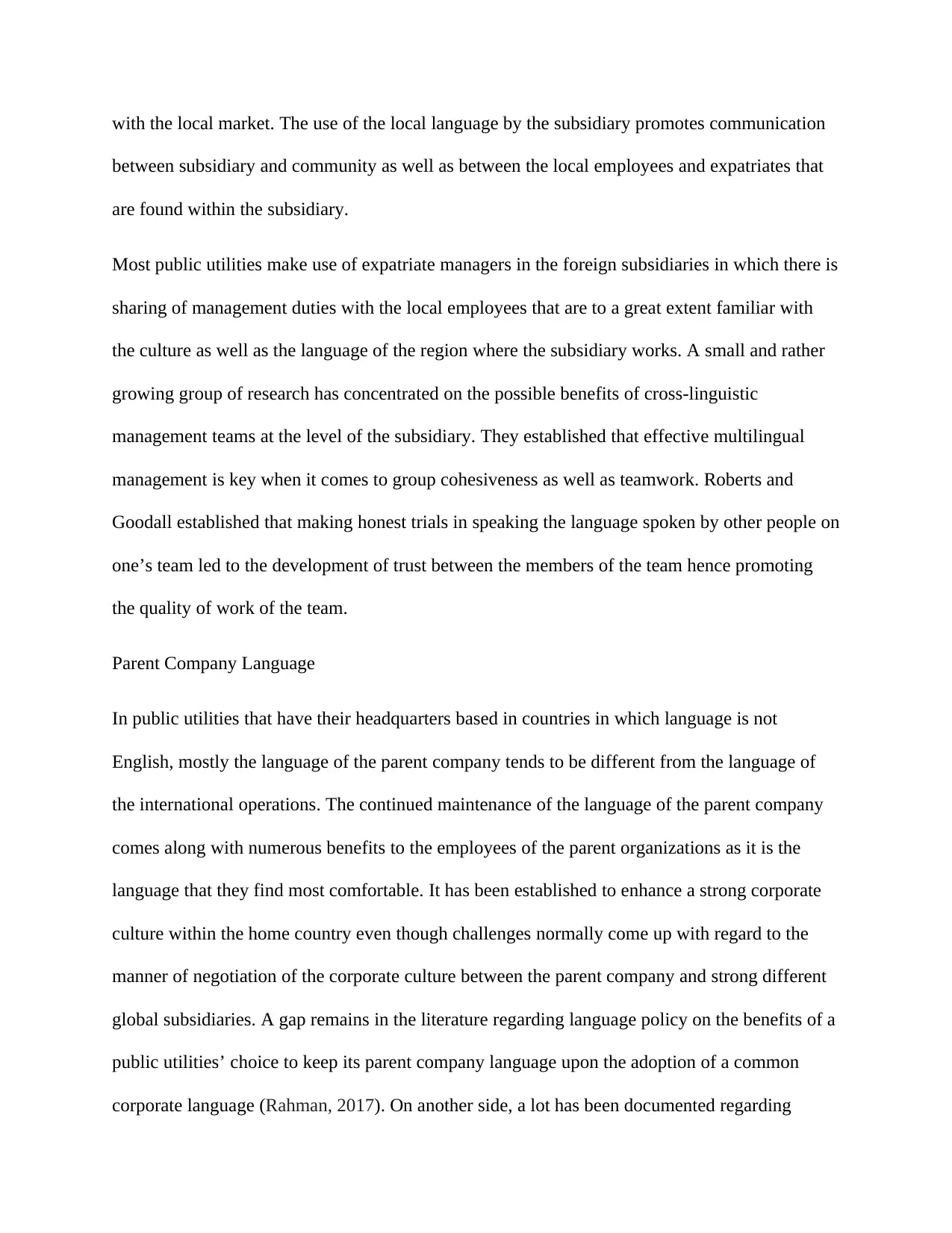
with the local market. The use of the local language by the subsidiary promotes communication
between subsidiary and community as well as between the local employees and expatriates that
are found within the subsidiary.
Most public utilities make use of expatriate managers in the foreign subsidiaries in which there is
sharing of management duties with the local employees that are to a great extent familiar with
the culture as well as the language of the region where the subsidiary works. A small and rather
growing group of research has concentrated on the possible benefits of cross-linguistic
management teams at the level of the subsidiary. They established that effective multilingual
management is key when it comes to group cohesiveness as well as teamwork. Roberts and
Goodall established that making honest trials in speaking the language spoken by other people on
one’s team led to the development of trust between the members of the team hence promoting
the quality of work of the team.
Parent Company Language
In public utilities that have their headquarters based in countries in which language is not
English, mostly the language of the parent company tends to be different from the language of
the international operations. The continued maintenance of the language of the parent company
comes along with numerous benefits to the employees of the parent organizations as it is the
language that they find most comfortable. It has been established to enhance a strong corporate
culture within the home country even though challenges normally come up with regard to the
manner of negotiation of the corporate culture between the parent company and strong different
global subsidiaries. A gap remains in the literature regarding language policy on the benefits of a
public utilities’ choice to keep its parent company language upon the adoption of a common
corporate language (Rahman, 2017). On another side, a lot has been documented regarding
between subsidiary and community as well as between the local employees and expatriates that
are found within the subsidiary.
Most public utilities make use of expatriate managers in the foreign subsidiaries in which there is
sharing of management duties with the local employees that are to a great extent familiar with
the culture as well as the language of the region where the subsidiary works. A small and rather
growing group of research has concentrated on the possible benefits of cross-linguistic
management teams at the level of the subsidiary. They established that effective multilingual
management is key when it comes to group cohesiveness as well as teamwork. Roberts and
Goodall established that making honest trials in speaking the language spoken by other people on
one’s team led to the development of trust between the members of the team hence promoting
the quality of work of the team.
Parent Company Language
In public utilities that have their headquarters based in countries in which language is not
English, mostly the language of the parent company tends to be different from the language of
the international operations. The continued maintenance of the language of the parent company
comes along with numerous benefits to the employees of the parent organizations as it is the
language that they find most comfortable. It has been established to enhance a strong corporate
culture within the home country even though challenges normally come up with regard to the
manner of negotiation of the corporate culture between the parent company and strong different
global subsidiaries. A gap remains in the literature regarding language policy on the benefits of a
public utilities’ choice to keep its parent company language upon the adoption of a common
corporate language (Rahman, 2017). On another side, a lot has been documented regarding
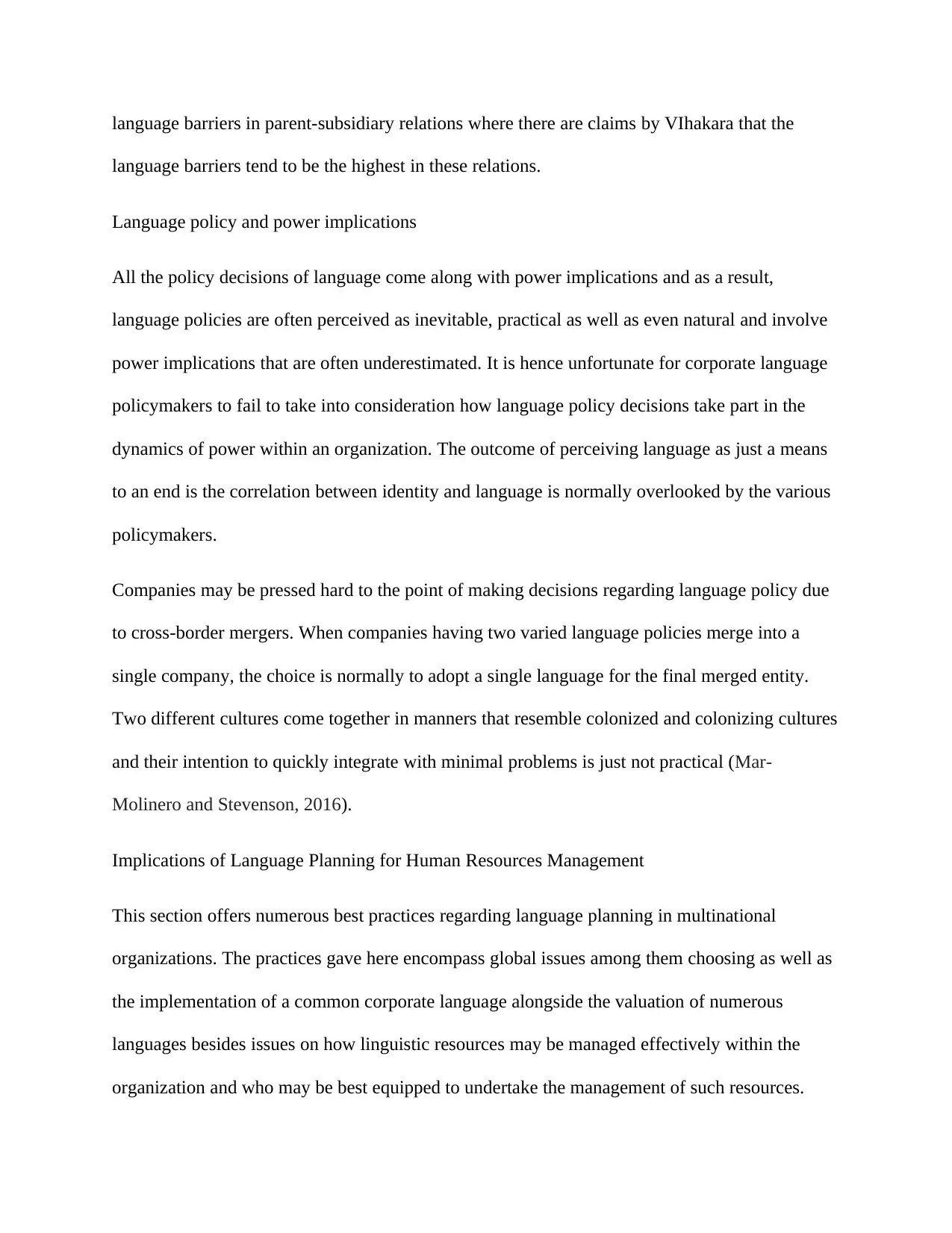
language barriers in parent-subsidiary relations where there are claims by VIhakara that the
language barriers tend to be the highest in these relations.
Language policy and power implications
All the policy decisions of language come along with power implications and as a result,
language policies are often perceived as inevitable, practical as well as even natural and involve
power implications that are often underestimated. It is hence unfortunate for corporate language
policymakers to fail to take into consideration how language policy decisions take part in the
dynamics of power within an organization. The outcome of perceiving language as just a means
to an end is the correlation between identity and language is normally overlooked by the various
policymakers.
Companies may be pressed hard to the point of making decisions regarding language policy due
to cross-border mergers. When companies having two varied language policies merge into a
single company, the choice is normally to adopt a single language for the final merged entity.
Two different cultures come together in manners that resemble colonized and colonizing cultures
and their intention to quickly integrate with minimal problems is just not practical (Mar-
Molinero and Stevenson, 2016).
Implications of Language Planning for Human Resources Management
This section offers numerous best practices regarding language planning in multinational
organizations. The practices gave here encompass global issues among them choosing as well as
the implementation of a common corporate language alongside the valuation of numerous
languages besides issues on how linguistic resources may be managed effectively within the
organization and who may be best equipped to undertake the management of such resources.
language barriers tend to be the highest in these relations.
Language policy and power implications
All the policy decisions of language come along with power implications and as a result,
language policies are often perceived as inevitable, practical as well as even natural and involve
power implications that are often underestimated. It is hence unfortunate for corporate language
policymakers to fail to take into consideration how language policy decisions take part in the
dynamics of power within an organization. The outcome of perceiving language as just a means
to an end is the correlation between identity and language is normally overlooked by the various
policymakers.
Companies may be pressed hard to the point of making decisions regarding language policy due
to cross-border mergers. When companies having two varied language policies merge into a
single company, the choice is normally to adopt a single language for the final merged entity.
Two different cultures come together in manners that resemble colonized and colonizing cultures
and their intention to quickly integrate with minimal problems is just not practical (Mar-
Molinero and Stevenson, 2016).
Implications of Language Planning for Human Resources Management
This section offers numerous best practices regarding language planning in multinational
organizations. The practices gave here encompass global issues among them choosing as well as
the implementation of a common corporate language alongside the valuation of numerous
languages besides issues on how linguistic resources may be managed effectively within the
organization and who may be best equipped to undertake the management of such resources.
⊘ This is a preview!⊘
Do you want full access?
Subscribe today to unlock all pages.

Trusted by 1+ million students worldwide
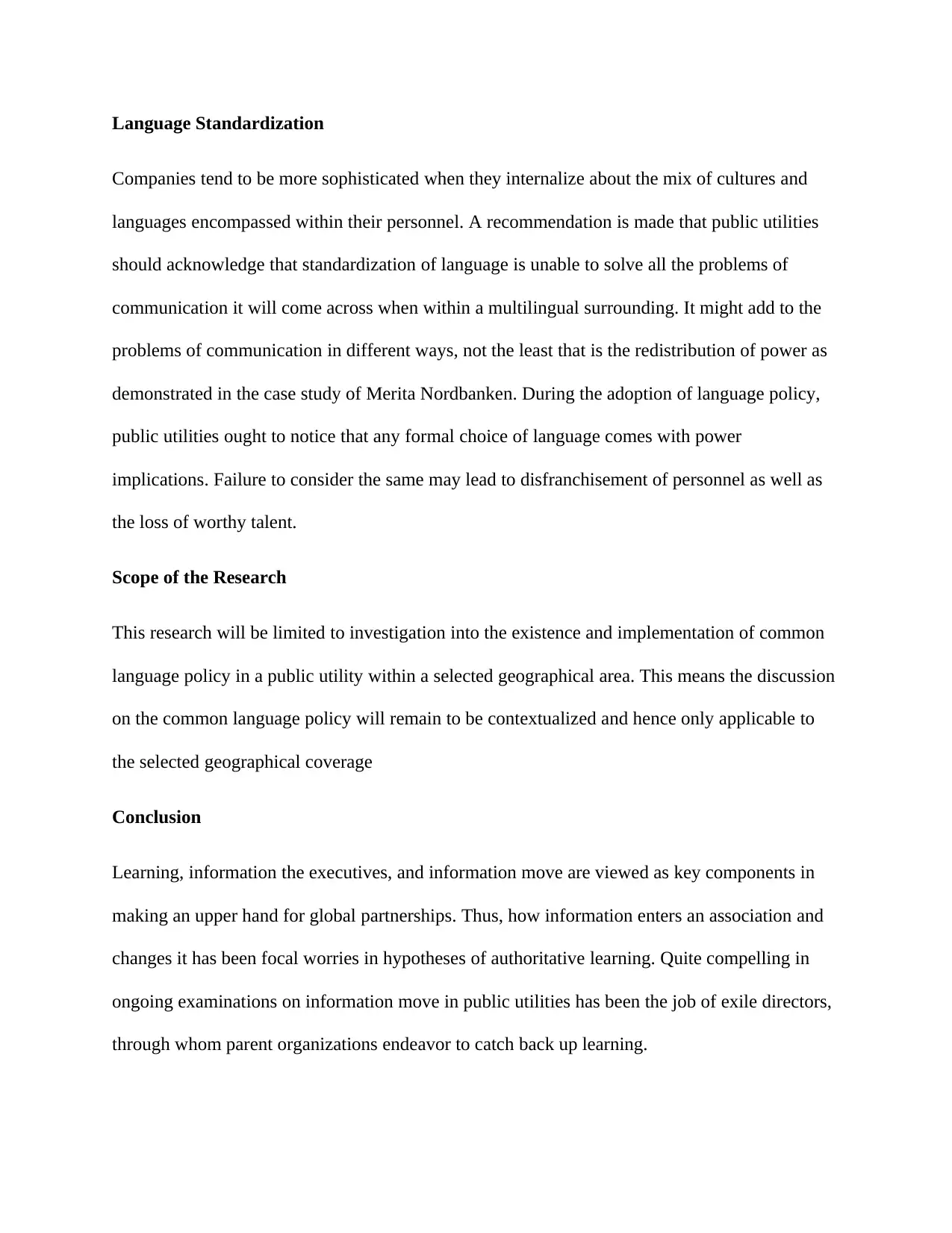
Language Standardization
Companies tend to be more sophisticated when they internalize about the mix of cultures and
languages encompassed within their personnel. A recommendation is made that public utilities
should acknowledge that standardization of language is unable to solve all the problems of
communication it will come across when within a multilingual surrounding. It might add to the
problems of communication in different ways, not the least that is the redistribution of power as
demonstrated in the case study of Merita Nordbanken. During the adoption of language policy,
public utilities ought to notice that any formal choice of language comes with power
implications. Failure to consider the same may lead to disfranchisement of personnel as well as
the loss of worthy talent.
Scope of the Research
This research will be limited to investigation into the existence and implementation of common
language policy in a public utility within a selected geographical area. This means the discussion
on the common language policy will remain to be contextualized and hence only applicable to
the selected geographical coverage
Conclusion
Learning, information the executives, and information move are viewed as key components in
making an upper hand for global partnerships. Thus, how information enters an association and
changes it has been focal worries in hypotheses of authoritative learning. Quite compelling in
ongoing examinations on information move in public utilities has been the job of exile directors,
through whom parent organizations endeavor to catch back up learning.
Companies tend to be more sophisticated when they internalize about the mix of cultures and
languages encompassed within their personnel. A recommendation is made that public utilities
should acknowledge that standardization of language is unable to solve all the problems of
communication it will come across when within a multilingual surrounding. It might add to the
problems of communication in different ways, not the least that is the redistribution of power as
demonstrated in the case study of Merita Nordbanken. During the adoption of language policy,
public utilities ought to notice that any formal choice of language comes with power
implications. Failure to consider the same may lead to disfranchisement of personnel as well as
the loss of worthy talent.
Scope of the Research
This research will be limited to investigation into the existence and implementation of common
language policy in a public utility within a selected geographical area. This means the discussion
on the common language policy will remain to be contextualized and hence only applicable to
the selected geographical coverage
Conclusion
Learning, information the executives, and information move are viewed as key components in
making an upper hand for global partnerships. Thus, how information enters an association and
changes it has been focal worries in hypotheses of authoritative learning. Quite compelling in
ongoing examinations on information move in public utilities has been the job of exile directors,
through whom parent organizations endeavor to catch back up learning.
Paraphrase This Document
Need a fresh take? Get an instant paraphrase of this document with our AI Paraphraser
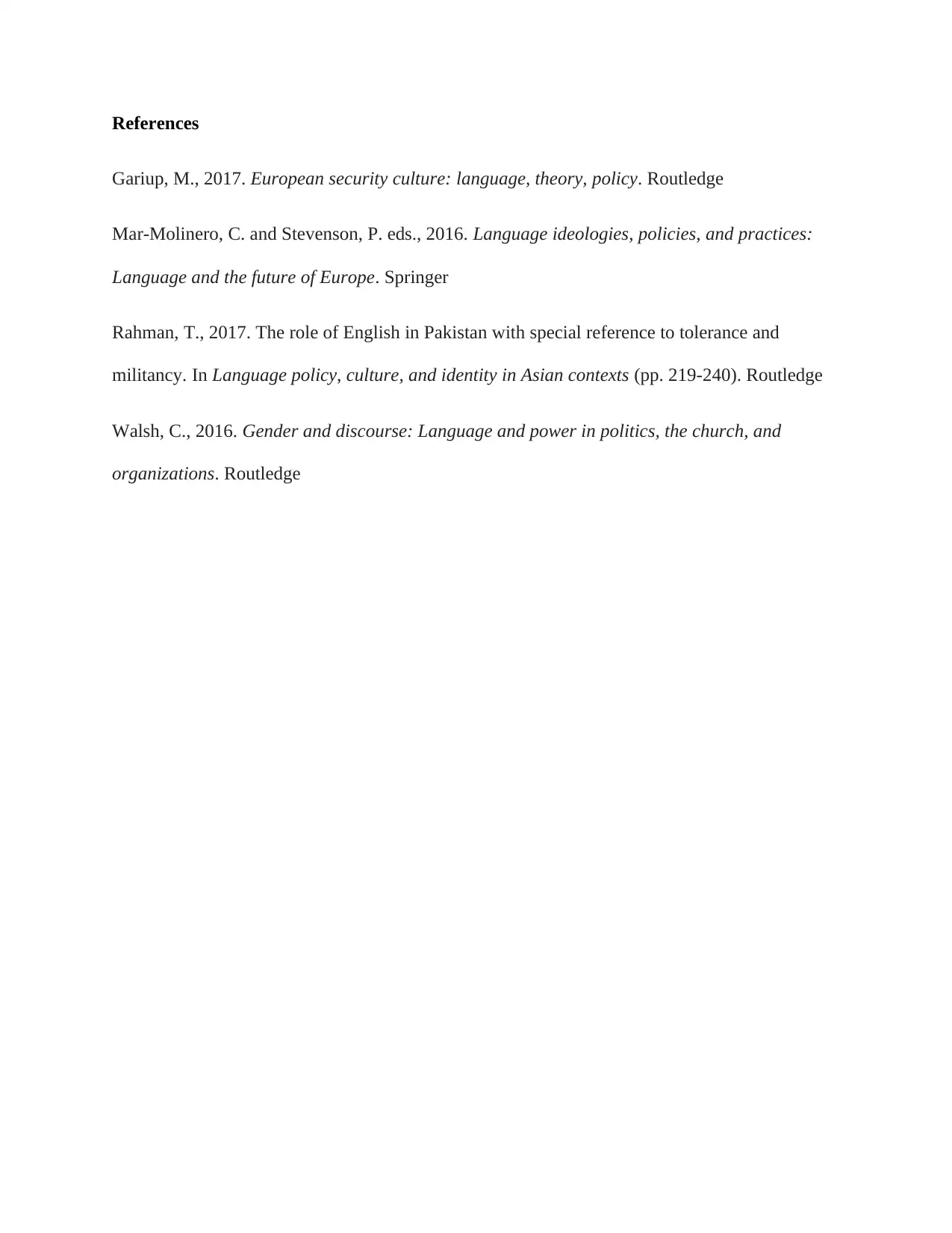
References
Gariup, M., 2017. European security culture: language, theory, policy. Routledge
Mar-Molinero, C. and Stevenson, P. eds., 2016. Language ideologies, policies, and practices:
Language and the future of Europe. Springer
Rahman, T., 2017. The role of English in Pakistan with special reference to tolerance and
militancy. In Language policy, culture, and identity in Asian contexts (pp. 219-240). Routledge
Walsh, C., 2016. Gender and discourse: Language and power in politics, the church, and
organizations. Routledge
Gariup, M., 2017. European security culture: language, theory, policy. Routledge
Mar-Molinero, C. and Stevenson, P. eds., 2016. Language ideologies, policies, and practices:
Language and the future of Europe. Springer
Rahman, T., 2017. The role of English in Pakistan with special reference to tolerance and
militancy. In Language policy, culture, and identity in Asian contexts (pp. 219-240). Routledge
Walsh, C., 2016. Gender and discourse: Language and power in politics, the church, and
organizations. Routledge
1 out of 8
Related Documents
Your All-in-One AI-Powered Toolkit for Academic Success.
+13062052269
info@desklib.com
Available 24*7 on WhatsApp / Email
![[object Object]](/_next/static/media/star-bottom.7253800d.svg)
Unlock your academic potential
Copyright © 2020–2026 A2Z Services. All Rights Reserved. Developed and managed by ZUCOL.



